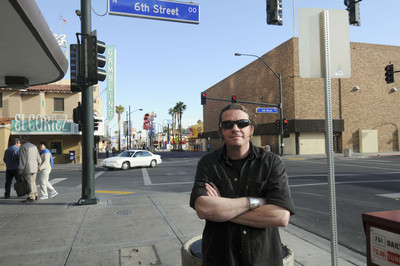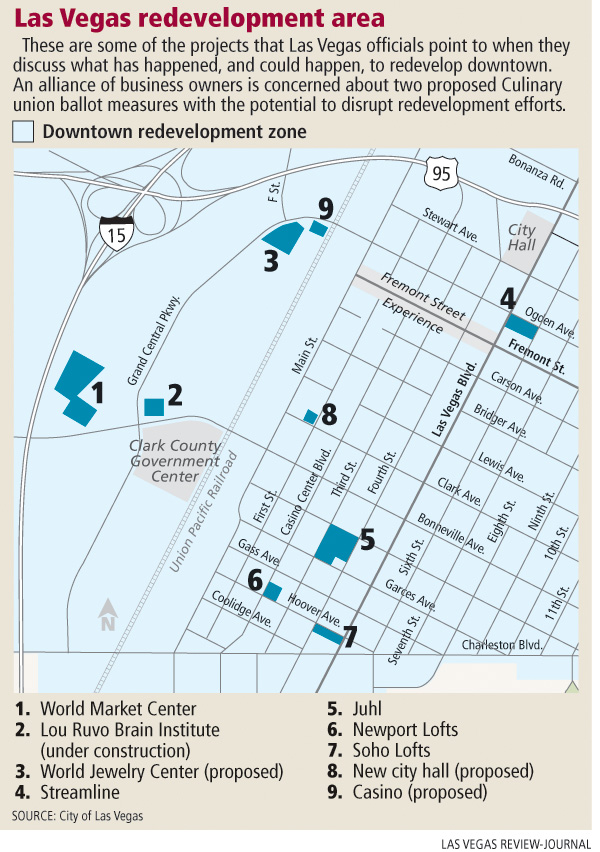Ballot measures worry downtown businesses
A group representing downtown Las Vegas businesses is raising money to combat the "collateral damage" of a campaign to force changes to the city's redevelopment efforts.
The Downtown Las Vegas Alliance, which counts many high-profile businesses as members, is building a legal fund to join the city of Las Vegas in opposing two ballot measures from Culinary union Local 226.
"I hope this doesn't turn into, 'We're against the Culinary,' " said Richard Worthington, president of the Molasky Group of Companies and the alliance's chairman. "Unfortunately, they've done a very clever job of turning this into a referendum on city hall."
The union has put forward two measures for the June 2 municipal election. One would require public votes on "lease-purchase" agreements, the financing method being considered for a proposed new city hall. The other would repeal the existing redevelopment area plan and mandate public votes to approve new redevelopment projects.
It's the second item that has the group most worried, Worthington said. He thinks it would effectively halt the redevelopment of downtown.
"There are a lot of deals out there in the works. When you change the rules like that, there are a lot of people who're going to get hurt. That's what's going to set back a lot of redevelopment."
That could include Downtown Las Vegas Alliance members such as Fremont Street casinos, condominium developers, the city of Las Vegas and Forest City, the developer in line to build the new city hall.
Not everyone in the alliance supports that project, Worthington said, nor do all members have a direct stake in redevelopment.
"We're not here to carry water for Forest City or for the mayor," he said. "There is one thing that is clear that unites us: These measures have serious collateral damage to the redevelopment effort."
That effort refers to city-assisted work to erase blight in an area originally created in 1986. It now covers downtown, Las Vegas Boulevard to Sahara Avenue, parts of the area known as West Las Vegas, and Eastern Avenue from Charleston Boulevard to Owens Avenue.
Culinary leaders say the redevelopment plan amounts to giving tax dollars to developers to build projects they would have done anyway. Property tax money that goes through the city's redevelopment agency could be used for education and other public needs, they say.
Redevelopment supporters say the increased property tax revenue wouldn't exist without redevelopment because without it, many projects would go to more affluent areas.
"What they're trying to do is, they're trying to overcome stigmas, higher perceived risk for capital," Worthington said. "The city reaches out and says, 'Hey, we're open for business. ... We have a whole basket of economic development incentives to give you pause. We want you to take a look at downtown.' "
Worthington and city leaders hope to make that broader argument about redevelopment and convince voters that a new city hall, costing an estimated $150 million or higher, is part of the revitalization process.
Worthington used one of his own projects as an example, an office building on City Parkway that now houses the Internal Revenue Service and other federal agencies.
For building there, Molasky Group receives annual payments of $60,000 to $70,000 for a 20-year period, based on the property taxes it pays.
That essentially covers $13 million in public improvements installed with the project. In return, about 400 jobs came downtown to the 92,000-square-foot building, with new property tax revenue. The developer also promised to build a second building of at least 100,000 square feet, and ended up building the 283,000-square-foot Molasky Corporate Center without incentives.
The incentive, known as Tax Increment Financing, made it possible to price the IRS office space low enough, Worthington said.
Worthington and Scott Carter of the Las Vegas business development office pointed to another project, the World Market Center, a massive furniture showcase center that was enticed downtown, bringing jobs and tourists.
The developers have made $40 million in public improvements but are getting incentives worth only $24 million.
"What we're giving them, they're giving so much more back in return," Carter said.
Not all businesses require incentives. Dan Monaghan said the city was very helpful in navigating the permitting process for his business, Fremont St. Guitars, located in the slowly growing Fremont East entertainment district.
He credits the city for investing in street-scape improvements and neon signs. Some neighboring businesses participated in a program that subsidizes improvements to facades and signs.
"They put money in before anyone was here. ... They actually did something before the fact," Monaghan said.
Another of Monaghan's neighbors, the El Cortez casino, has made several upgrades, including new signs, a new entrance and renovation of an old hotel into El Cortez Cabana Suites. General Manager Mike Nolan said redevelopment money played a small part but was not instrumental in moving those projects forward.
Nolan stressed that the casino has good relations with the Culinary union and that he sees "both sides of the fence" when it comes to redevelopment.
"We're not counting on the redevelopment," he said, adding that the area does need it. "I don't understand why you wouldn't want to fix up your downtown like any other city."
Contact reporter Alan Choate at achoate@reviewjournal.com or 702-229-6435.


















